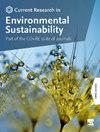A field methodology to advance social equity and transformative adaptation to climate change in smallholder communities
IF 3.7
Q2 ENVIRONMENTAL SCIENCES
Current Research in Environmental Sustainability
Pub Date : 2024-01-01
DOI:10.1016/j.crsust.2024.100272
引用次数: 0
Abstract
Global climate policies recognize the urgent need to address the inequitable impacts of climate change on smallholder agricultural communities, but there is limited understanding of how to accomplish this in practice. We contribute to closing this gap through the design of a participatory qualitative methodology intended to nurture locally-led “transformative adaptation pathways” that strengthen social equity and sustainability. Our conceptual framework draws upon theories of social equity and justice rooted in participatory parity—values and norms that encourage people to interact with one another as equals and synergistically nurture recognitional, distributional, representational and intergenerational equities. Recognizing that social equity is enhanced when poor and vulnerable people gain decision-making power that expands their access to resources and opportunities, we question how people understand and experience social equity and its relationship to their capacity to adapt. We also ask how norms about gender, generation, and socio-economic status shape people's understandings and experiences of social equity and adaptation. To address these questions, we illustrate the methodological approach with evidence gathered from pilot tests conducted in smallholder communities of Kenya and Philippines. Our findings show how understandings of fairness provide a basis for learning, eliciting comparative and contextualized findings that can inform community-based adaptation. Overall, we demonstrate that in the face of social processes that typically fuel inequities, participatory tools and learning tactics can serve to empower low-income women and men to identify, contribute to, and monitor actions that nurture their community's progress towards strong and equitable climate adaptation capacity.

求助全文
约1分钟内获得全文
求助全文
来源期刊

Current Research in Environmental Sustainability
Environmental Science-General Environmental Science
CiteScore
7.50
自引率
9.10%
发文量
76
审稿时长
95 days
 求助内容:
求助内容: 应助结果提醒方式:
应助结果提醒方式:


